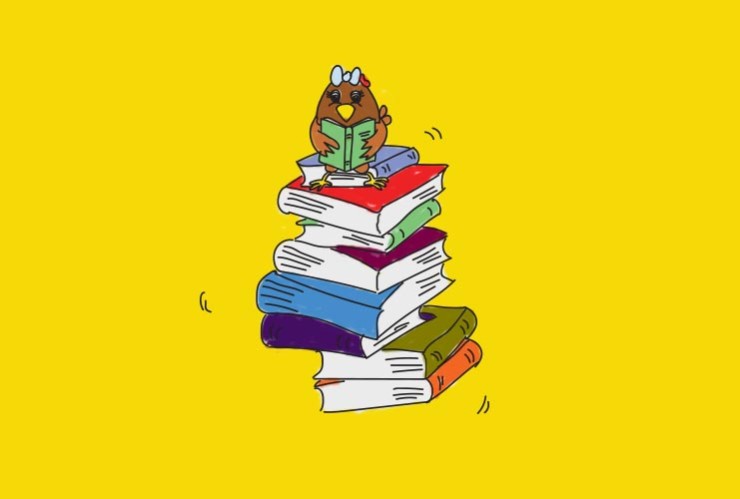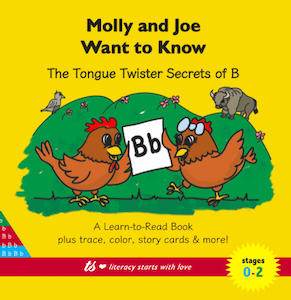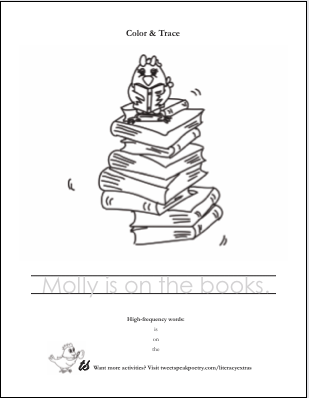Now, you can help a child learn to read with the young chickens Molly and Joe—two wide-eyed early readers who are full of curiosity, mischief, and mirth! Rich language and amusing illustrations combine with strategies that address how the brain remembers best: pattern, repetition, visual novelty, and multi-sensory experiences.
Children demonstrate six reading stages, from zero to five (print awareness to analysis and reasoning). Our first multi-level Molly and Joe Want to Know reader serves stages zero to two: print awareness, sound and letter pairing, and automatic reading.
You can use the Reader to read for pleasure (even for babies!); then teach the letter b; then teach or reinforce other sound/letter relationships, high-frequency words, new vocabulary, and writing.
In a move-quickly-from-one-thing-to-the-next culture, it can be surprising to learn that stage two learners benefit from repeated experience with the same texts and materials, until reading is automatic. To make the necessary repetition easy and fun, we’ve included simple games with cut-out materials (all reusable) and activities in the Reader. You’ll find Color & Trace Pages, Biscuit Bingo, Story Cards (for Matching, Story Train, Partners in Rhyme, and Story Challenge games), Letter Dress-Up Cards (for sound and letter associations and word building), and Sentence Builders.
Color and Trace “Molly is on the books”
Our Color & Trace pages help teach high-frequency words, develop fine motor skills and handwriting, and solidify memory of the letter b or other sound/letter relationships.
So maybe you’re looking for extra, fun reading activities to support the learn-to-read journey. To that end, we’re sharing: “Molly is on the books.” (Molly is that delightful little chicken atop a teetering tower of books!) If you’ve already got the Molly and Joe reader, then you have other fun coloring pages that teach high-frequency words.
5 Fun Facts About Books
1. The Molly and Joe readers keep most of their sentences short and sweet. But not all books do. In his book Les Misérables, Victor Hugo wrote one sentence that was over 800 words long. That’s a real mouthful!
2. According to Google, as of 2010 there were 129,864,880 in the world. Add to that another two-and-a-quarter million books they estimate are published every year, and Molly has a pretty tall book tower to sit on in 2017!
3. The Welsh National library has a teeny, tiny book (maybe the smallest anywhere) that measures just 1mm by 1mm. The pages in this itty bitty version of Old King Cole have to be turned with a needle.
4. Japanese has a word for the habit of acquiring books but not reading them. We’ve read that tsondoku is formed from the words tsumu, which means to pile up, and doku, which means reading, and plays with the contraction of tsunde oku, which means to leave piled up.
5. If you’d rather stack books on your head, instead of sitting on a book tower like Molly, you might be interested to know that the world record for the most people with books balanced on their heads at the same time is 998, in Sydney Australia in 2012.
Watch a Video About How a Book is Made
Books Limerick Poetry Prompt
Try your hand at a limerick about books. Use the “fun facts” as inspiration if you like. Need more inspiration? Check out our limerick infographic.
This book is so much fun! I used it with about 10 Kindergarten and first graders who are labeled as “at-risk,” (I like to call them my promising students), and we had a blast reading the poem and doing the activities. The poem produces giggles and conversation, and the activities are easy to prepare and fun to complete! Plus, I love that I can use the activities over again. This is a must have in a teacher’s classroom.
—Callie Feyen, at-risk literacy specialist
- Free E-Book + Poetry Prompt! - April 14, 2025
- Braving the Poem: Interview with Catherine Abbey Hodges - March 24, 2025
- National Poetry Month Is Here + Prompt! - March 14, 2025



Katie says
Oh, I’ve had some fun with this one!
In the process of playing around with it, I’ve learned that there is a Japanese word for the habit of buying books but not reading them: tsondoku
The root for tsondoku means “leave piled up” for which I must plead guilty!
Let me get this book
Even though I know it looks
As if I’ll never stop
Veering into bookshops
Eager to acquire one more
Please will you hold the door
I need just one more
Last set of book
Ends for my
Den’s bookshelves that are spilling on the floor.
Unless you know this is another false
Pledge.
I like the flow of the first verse better than the second – any suggestions?
L.L. Barkat says
Katie, fun poem. Since you asked for suggestions, here is how I might see the poem revised:
Pledge
Let me get this book,
even though I know it looks
as if I’ll never stop
veering into bookshops.
Please will you hold the door
I need just one set more
of spill-preventing book ends
for the full shelves in my den!
Katie says
L.L.
Like it! Thanks:)
Good title;)
Gratefully,
Katie
P.S. Had a good laugh at my self after scrolling back up and seeing the source of tsondoku!
L.L. Barkat says
We need to borrow that Japanese word right into English, don’t we? I’m sure there are many of us tsondokuites afoot!
That’s something I sort of learned from reading Ted Kooser. He recommends taking “extra” descriptive parts of our poems (especially location information) and making them into the poem titles. I think you can do that with extra thoughts, as well—putting them into the title where they can do the heavy lifting, as he says.
Katie says
Great tip, thanks L.L.!
I always learn something new from TSP:)
Appreciate your suggestion and you sharing what you’ve learned. The prompts and then the feedback in the comments have helped me so much in my poetry writing!
Grateful for this community:)
Katie